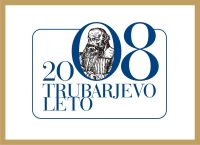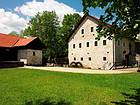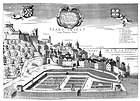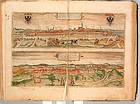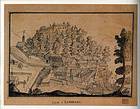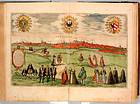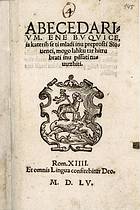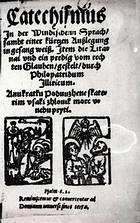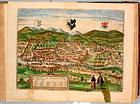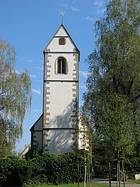The principal life events and works of Primož Trubar, the beginner of literary Slovene, the spiritual reformer and designer of the first outlines of Slovene national sovereignty:
1508 born in June to mother Jera and father Miha in the mill below the village of Raščica near Turjak.
1520 begins attending school in Rijeka (first encounter with Glagolism)
1521 attends convent school in Salzburg (earns his living as choir singer, first encounter with Reformation ideas)
1524 choir singer in the Trieste cathedral and personal assistant to Bishop Pietro Bonomo; in his circle he becomes acquainted with Calvinist and Zwinglian ideas, as well as the writings of Erasmus of Rotterdam with translations in German, Italian and Slovene; Bonomo presents Trubar with a parish in Loka pri Radečah even before Trubar's consecration
1528 Trubar leaves the parish to the vicar and enrols in an advanced course of civic school at St Stephen's in Vienna
1529 retreat from Vienna (Turkish threat), return to Trieste
1530 consecration and beginning of priestly service in Laško, buying books, first disputes due to preaching against building of new churches
1535 preacher in the Ljubljana Cathedral of St Nicholas
1540 Trubar expelled from Ljubljana by the governor general of the Carniola province due to preaching new religious convictions, Bonomo procures him a preaching service in Trieste and affords him the chaplain benefice of St Maximilian in Celje
1542 through Bonomo's intervention, Trubar becomes a bishop's canon in Ljubljana; strengthening of Reformation mentality, socialisation with supporters (still as a priest within the Catholic Church reputation)
1545 beginning of Tridentine church council (seeking solutions for arrangement and reformation within the Catholic Church)
1547 Trubar economically organises a neglected parish in Šentjernej; due to the Counter-Reformation activities of Bishop Tekstor, he hides to avoid arrest
1548 spiritual court excommunicates Trubar, relieves him of all church functions and seizes his property (particularly books); escapes to Germany; converts to Protestantism at preacher Veit Dietrich in Nuremberg and begins working as a preacher in Rothenburg ob der Tauber
1549 in Germany, Trubar marries Barbara Sitar from Kranj
1550 publication of the first books printed in the Slovene language (Tübingen) – Abecedarium (Primer) and Catechismus (Catechism) (in Gothic alphabet)
1553 parson in Kempten; efforts to alleviate disputes between supporters of different Reformation movements, beginning of cooperation with Vergerio, the former Bishop of Koper
1555 publication of four of Trubar's books (with the financial support of Christoph, duke of Württemberg: new edition of Abecedarium (Primer) and Catechismus (Catechism) (in Roman alphabet), Ta evangeli svetiga Matevža (Gospel According to St Matthew), Ena molitov (A Prayer); the Peace of Augsburg introduces the decree that the ruler of a country determines the religion of his serfs (since the Habsburgs remained Catholic, the same was to apply to the population of their lands of Carniola, Carinthia and Styria)
1557 publication of Ta prvi dejl tiga noviga testamenta (First Part of the New Testament)
1561 Trubar becomes headmaster of the Urach Bible Institute, intended especially for publishing Slovene and Croatian Protestant books (founded by the former governor general of Styria, Ivan Ungnad); Trubar is preocupied writing book introductions and dedications and translating; moreover, he responds to the invitation of the provincial states of Carniola to return as a superintendent of the reformed church in his homeland; publication of the book Artikuli oli dejli te prave stare vere kersčanske (Articles or fragments of the true old Christian faith; Augsburg faith with elements of Württemberg and Saxon faiths)
1562 Protestant superintendent in Ljubljana; organisational work, solving ideological and personal tensions in the Protestant community, proclamation tour in the Goriško region
1564 resentment of the Inner Austrian Archduke Karl caused by the publication of Trubar's book Cerkovna ordninga (Church Canon), for its determination of the Protestant church administration organisation and rituals interferes with the ruler's competence founded on the Peace of Augsburg principles
1565 Trubar expelled to Germany, accompanied by Jurij Dalmatin; death of wife Barbara
1566 parson in Derendingen, Trubar's marriage to Anastasia, translations
1567 on the initiative of Protestant theologian Andreae, Trubar (secretly) visits Carniola for the last time to obtain reliable information on Islam from captured Turks; he publishes three books: Ta celi katehismus (The Whole Catechism), Svetiga Pavla listuve (Letters of St Paul) and a hymnbook
1575 publication of Katehismus z dvejma izlagama (Catechism with two interpretations)
1581 after the death of his second wife Anastasia, Trubar marries Agnes; he organises the accession of Carniolan, Carinthian and Styrian Protestants to the Formula concordiae (attempt to overcome disparities between the dogmatic movements in Protestantism)
1582 publication of Ta celi novi Testament (The Whole New Testament)
1584 Trubar lives long enough to see the publication of Dalmatin's translation of the entire Bible and Bohorič's Slovene grammar book Arcticae horulae
1586 Trubar dies on 29 June; he was buried in Derendingen with great honours
1595 Trubar's son Felicijan publishes Trubar's last book – translation of Luther's Hišne postile (House Postils)
